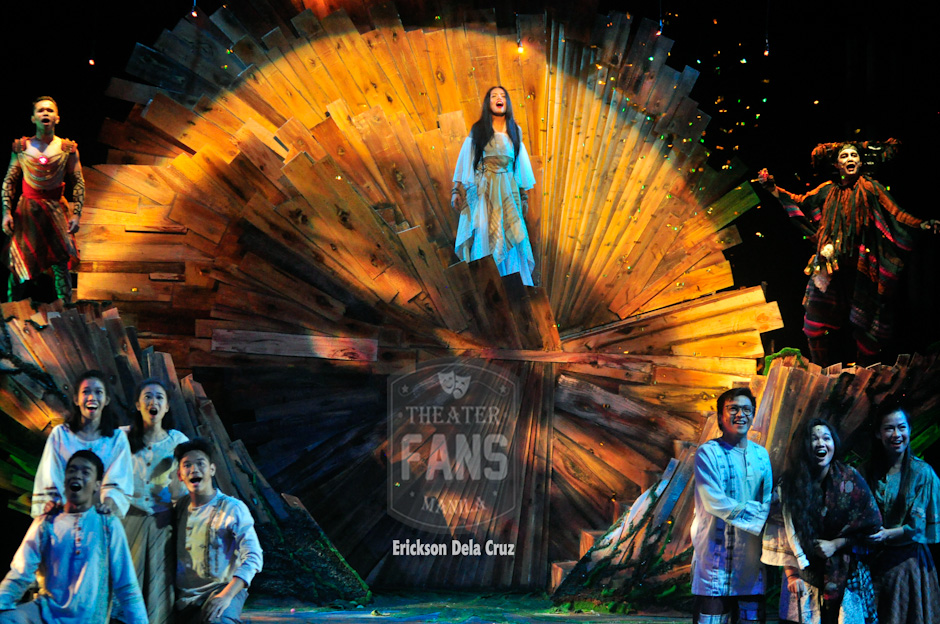
REVIEW: Juan Tamad—a riotous children’s musical (for adults)
Aiming for comedic gold in theater is a tightrope act: fall one way, and get nothing, not even the slightest giggle; fall the other, and find yourself just inches away from tactless. Tanghalang Pilipino treaded that line without any falls (much to the audience’s delight!), as the Filipino folklore icon came alive on stage in this Nick Joaquin-penned children’s story on love and debauchery.
It all starts when Monte Banahaw (Aldo Vencilao), über masculine god of war, began pining for Mariyang Makiling (Manok Nellas), ever-alluring goddess of love. Both of them stand atop the apices of the mountains they embody, on an immense set piece (by production designer Marco Viaña)—planks radiating behind them like a wooden halo, evoking an unearthly realm with a heavily folkloric undertone.
But as pride clouded Monte Banahaw’s affection for Mariyang Makiling, he scoffs it all off and does nothing to pursue her. Deemed unworthy of her love, Monte Banahaw asks his brother Ba’i (JV Ibesate) to create a love potion to spite Mariyang Makiling—a potion that will have her head over heels for the most vacuous person in existence.
Hilarity ensues as Mariyang Makiling helplessly goes to the moon and back just to gain the admiration of the protagonist, a perennially clueless Juan Tamad (Ybes Bagadiong).

Juan Tamad (Ybes Bagadiong) and Mariyang Makiling (Manok Nellas)
Hit-or-miss humor
Left with no room for subtleties, the show’s brand of humor was as straight to the point as the plot, but effectively so. Their intentionally over-acted delivery (from Monte Banahaw’s every outburst to even a Kris Aquino impression by Antonette Go) was successful—comically, at least.
The show’s comedic approach, for the most part, is arguably a hit-or-miss, with slapstick, racial jokes, and sexual innuendo casually thrown around. All the crude humor (like when the lisp of one character was obviously intended for laughs) make even the constant breaking of the fourth wall seem like a smart move. Nevertheless, its humor, substantially meta at times (at one point, the show’s production manager even came out on stage when Juan Tamad lived up to his name and failed to show up on cue!), is where the play gets most of its charm.

Aldo Vencilao as Monte Banahaw; photo by Erickson Dela Cruz
A musical?
Juan Tamad was nothing less than a sensory treat; John Batalla’s lighting especially drowns the production with hues, framing it as a more magical portrait straight out of a storybook. Just as apt was TJ Ramos’ score, creating a soundscape to match the stunning visuals.
If that weren’t enough, scattered all throughout the play were songs, complete with playful choreography by Ronelson Yadao. But the thing is this: the numbers (though entertaining and helpful with characterization) just seemed unnecessary to plot development, that removing them won’t even seem like an overhaul.
Juan Tamad, though adapted from a children’s book from the ‘70’s, wasn’t awash with nostalgia. Just like how the source material had a relatively more contemporary feel (name at least one other folktale which would have an actual court trial between two gods!) when it was released roughly four decades ago, director Jonathan Tadioan opted to incorporate pop culture references (even a popular Ex Battalion song), solidifying the production’s relatability with its audience.

Monte Banahaw (Aldo Vencilao) at Maria Makiling (Manok Nellas); photo by Erickson Dela Cruz
As with the play as a whole, shallow as the premise may have been, there were some surprising “adult” realizations: that although love can come even if you weren’t looking for it, you can’t ever force your love on someone else. In a pivotal scene between the protagonist and a talking cloud (Lhorvie Nuevo), Juan was more mature than one would have ever expected, vaguely reminiscent of a popular Stephen Chbosky quote: “We accept the love we think we deserve.”
In the end, underneath all the gimmick and a thin narrative, one will find heart (or some fragment of it), a moral lesson or two, and genuine laughter. An hour and a half of walking on a tightrope might not be the worst idea, after all—that’s if Juan Tamad arrives on time for the next show!

